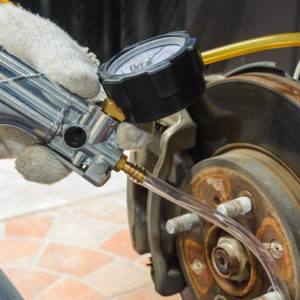Smoking Brakes: What’s Causing It?
This can be a frightening scenario, especially for new drivers. Seeing smoke or smelling something burnt when stepping on the brakes is certainly not a good sign—but why is it happening?
If you’re wondering why your brakes are producing smoke whenever you’re driving, here are the most common causes:
Overheated Brakes
Although smoking brakes may be a sign of a serious problem in your braking system, it may also be caused by overheated brake components due to excessive braking.
For example, driving down a very long hill where you have to keep the brakes applied to prevent overspeed may cause excessive heat to build up, leading to a burnt smell or, in worse cases, actual smoke coming out of the front or back of your vehicle.
Here’s a tip: when you’re driving down a very long and somewhat steep hill, if you shift to a lower gear (this works even on an automatic transmission) to limit your speed instead of riding the brakes, they will remain cooler. The problem with overheated brakes is that they don’t stop the car well after they reach a certain temperature, so again, downshift rather than ride the brake on hills.
Aside from going downhill, take note that braking suddenly while driving at high speeds or accelerating while pressing your brakes at the same time may also cause the same symptom. A long, hard stop from high speed can cause the brakes to overheat and become inefficient, too – high speeds should be avoided, but there are 70 mph speed limits on some interstates and sudden obstacles may create the need for a long, hard braking event.

New Brake Pads and Rotors
Some (not all) new brake pads may produce a burnt smell rather than actual smoke until the brake pads have become seasoned. A competent mechanic will “burnish” the brake pads using the 30 30 30 method, which is 30 normal stops from 30 miles per hour with a 30-second cooldown between each stop. This is recommended by some major brake manufacturers for new brakes.
A competent mechanic will “burnish” the brake pads using the 30 30 30 method, which is 30 normal stops from 30 miles per hour with a 30-second cooldown between each stop. This is recommended by some major brake manufacturers for new brakes.
–Richard McCuistian, ASE Certified Master Automobile Technician
If the “burnishing” procedure isn’t followed after installing new brake pads, this burnt smell scenario may be normal. If a smoking/smelly brake condition continues, the best course of action is to take your vehicle to a mechanic.
Stuck Caliper or Wheel Cylinder
One of the common reasons why your brakes overheat is a malfunctioning or stuck caliper. Internally damaged or externally pinched hoses or malfunctioning metering/proportioning or ABS valves can trap fluid at the caliper(s) and cause overheating brakes as well. We’ll talk more about restricted brake hoses in the next section.
Anything that hinders your caliper pistons from retracting or sliding back into their released position may cause too much friction coupled with heat and/or smoking.
In a similar instance, a stuck wheel cylinder may also be the culprit.
If you notice that your vehicle pulls to one side when braking, or any other brake related symptom, there is a great chance that something is wrong with your brake system.
Needless to say, anything wrong with the brake system is a safety risk for you and your passengers.
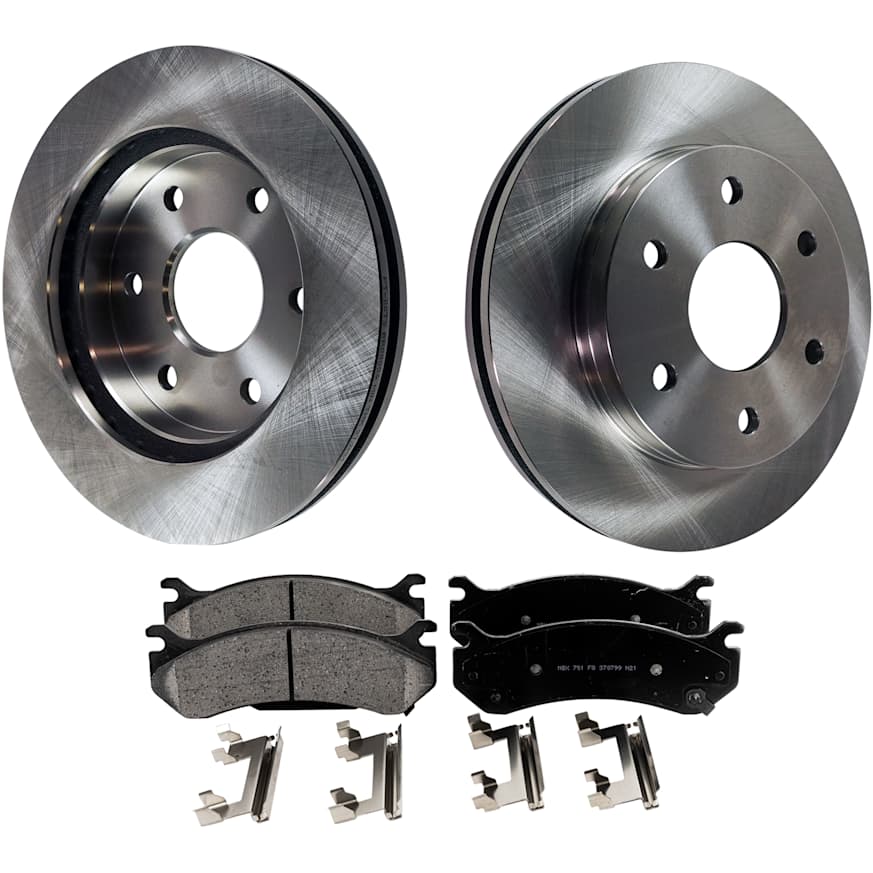
Restricted Brake Hose
Aside from stuck brake components, another thing that could cause your brakes to remain applied is a restricted brake hose.
Just like any other car part, this rubber hose can wear out over time. This may cause blocked brake fluid flow in one or both directions. The pressure being fed from the master cylinder to the brake assembly can be 2,000-3,000 psi, but a restricted hose on one side can cause the brake on that wheel to apply slightly later than the opposite wheel, causing a temporary pull to the non-clogged side when the brakes are first applied. The pressure returning from the caliper, on the other hand, isn’t nearly as intense, thus it can become trapped in the caliper, keeping the brake pad dragging against the rotor – resulting in heat and possibly smoke.
In some cases, blockage in a brake hose may cause your hose to act as a 1-way valve. For example, brake fluid may successfully travel to the caliper from the master cylinder. However, a flap or blockage in the hose may block the brake fluid from coming back, causing the brakes to be constantly applied, which leads to overheating and smoking brakes.
Check out these videos for tips on how to replace your brake hose:
Malfunctioning Brake Master Cylinder, ABS, Metering, or Proportioning Valve
Any component that malfunctions so that it does not allow brake fluid pressure to return to the master cylinder after a braking event may cause brakes to overheat and/or smoke.
While it won’t cause overheating brakes, the master cylinder more often fails in a different way as as described below:
You apply the brake and it feels normal, but as you hold your foot on the pedal waiting for the drive thru line to move or the light to change, you slowly feel the pedal getting lower and lower to the floor. You put the car in neutral, release the brake pedal and reapply, and the same thing happens again. This is typically a failed master cylinder.
If your brake master cylinder is faulty or if you think that it is due for a replacement, have it checked or replaced by a trusted mechanic.
Driving with Brakes Applied
There are service brakes to stop the vehicle and there are parking brakes to keep it from rolling once it’s parked. Service brakes use friction between the pads and rotors or shoes and brake drums to stop the vehicle. Fluid pressure is delivered to the disc calipers or wheel cylinders whenever you press the brake pedal. The brake shoes and pads are fixed and attached to the spindle or axle housing, and the disc and drum are attached to the wheel and its tire, which provide traction/friction against the road surface for acceleration, steering, and stopping.

Driving with the parking brake engaged is fairly common if you’ve covered up some of your warning lights with a picture or a business card. If the brake warning light isn’t working, well, the same thing can happen, and driving a long way with the parking brake applied can ruin the rear brake linings and (on drum brakes), all the springs and the brake drum, as well. In extreme cases, the fluid may boil, and you may apply the brakes after driving several miles only to find a very spongy pedal due to the air bubbles in the boiling fluid.
How to Fix Smoking Brakes
When the park brakes are applied, the rear brakes are mechanically applied (usually by a cable, but they can be electric) rather than by fluid pressure. Some folks call parking brakes “emergency brakes” and they can be used for that, but they don’t stop the car as well as the service brakes.
Whenever any of the brakes is applied while you’re trying to drive the vehicle rather than trying to stop it, the resulting friction will produce large amounts of heat. Sometimes you may see smoke in these cases – sometimes you may not see smoke, but you’ll know something is wrong.
Now that you are aware of the reasons why your vehicle’s brakes are producing smoke, let’s move on to how you can fix the problem.
The best thing you should do at this point is to bring your vehicle to the service center for proper diagnosis. Your mechanic should be able to pinpoint the problem and fix the issue for you.
Replacing brake components may be necessary, depending on the cause of the problem. To prevent corrosion, it is also advisable to take any brake work as an opportunity to lubricate any moving part with high-temperature grease.
Check out this tutorial video in case you need to replace your front brakes:
Products Mentioned in this Guide
Any information provided on this Website is for informational purposes only and is not intended to replace consultation with a professional mechanic. The accuracy and timeliness of the information may change from the time of publication.



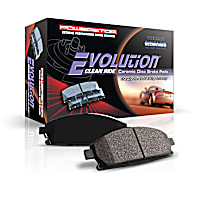 Brake Pad Set
Brake Pad Set
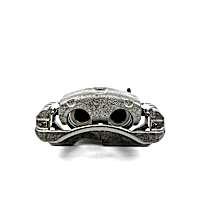 Brake Caliper
Brake Caliper
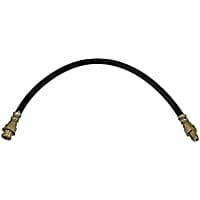 Brake Hose
Brake Hose
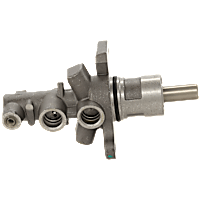 Brake Master Cylinder
Brake Master Cylinder
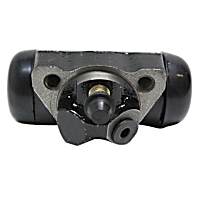 Wheel Cylinder
Wheel Cylinder





